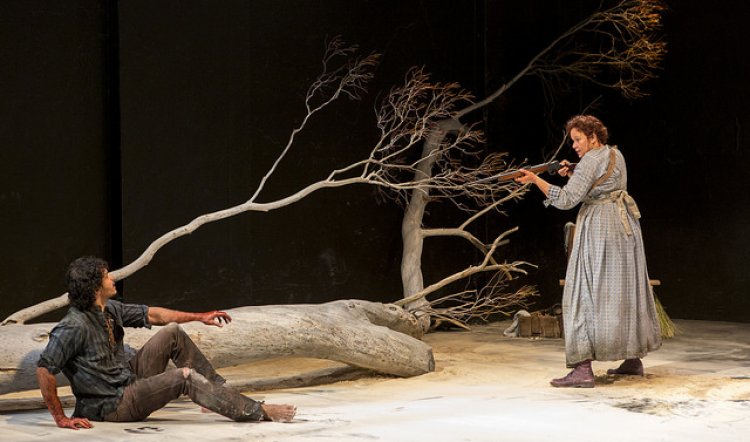
THE DROVER'S WIFE
THE DROVER’S WIFE, Belvoir in association with Oombarra Productions at Upstairs Belvoir, 17 September-16 October 2016. Photography by Brett Boardman: above - Mark Coles Smith and Leah Purcell; right: Will McDonald
The best actors have no vanity when it comes to performance. They leave the way they look and feel in everyday life at the door and, if surrounded by an equally good creative team, immerse themselves deeply, dangerously and totally in the role.
Leah Purcell is one of those actors and for the audience it’s thrilling, cathartic and the greatest gift. In this instance, Purcell has also written the piece and the result is mesmerising. To say it’s “adapted” from Henry Lawson’s short story The Drover’s Wife isn’t exactly how it is. This play stands on its own as a new piece in the growing mosaic of Australian theatre.
In her program notes Purcell tells how, as a child, she absorbed the famous 3000-word story – first published in The Bulletin in 1892 – through her mother’s reading and reciting of it. What is now on stage (and apparently also for the screen before long) is the distilled essence of Lawson's tale refracted through a contemporary female and Indigenous lens.
Purcell uses the original story as a springboard rather than a straitjacket and the uncompromising leaps of imagination away from Lawson’s deceptive simplicity – bleakly romantic as it is – make for a deeply powerful and unexpected narrative.
Purcell is the drover’s wife – Molly Johnson. While her husband is away she is marooned in a scraggly dwelling with her children and (unseen) dog, Alligator. It is a desiccated, harsh place and the creative team (set designer Stephen Curtis, costume designer Tess Schofield and lighting designer Verity Hampson) has also absorbed the spirit of Lawson’s landscape ...
“Bush all round – bush with no horizon, for the country is flat. No ranges in the distance. The bush consists of stunted, rotten native apple-trees. No undergrowth. Nothing to relieve the eye save the darker green of a few she-oaks which are sighing above the narrow, almost waterless creek. Nineteen miles to the nearest sign of civilisation – a shanty on the main road.”
Molly is heavily pregnant, her burgeoning body a symbol of life in this stultifying place. The precariousness of her predicament is immediately apparent when she comes out of her house to find a man, collapsed and possibly dead in her front yard. The scene has already been set by the first of a series of increasingly uneasy musical clues (composer/sound design The Sweats). Accustomed as we are to the brutishly unromantic New Westerns (Lonesome Dove, Deadwood et al) it’s clear that little of this day will be good.
It’s a significant contrast to Lawson’s view: “Occasionally a bushman in the horrors, or a villainous-looking sundowner, comes and nearly scares the life out of her. She generally tells the suspicious-looking stranger that her husband and two sons are at work below the dam, or over at the yard, for he always cunningly inquires for the boss.”

As if these roughnecks will meekly depart and not attempt to take and kill! However, the prone body is not only alive but is a fugitive Aborigine, Yadaka (Mark Coles Smith). Molly trains a rifle on him with unflinching resolve until, to her despair – “just another few days” she wails – her waters break. (Later her breasts leak milk and these expressions of her femaleness are a shocking contrast to the surrounds of dry, bleak and barren land and humanity.)
Yadaka not only helps Molly but to her irritation, also befriends her young son Danny (Will McDonald). It’s quickly obvious that her annoyance and suspicion are as much about how rarely she has experienced kindness and gentleness as at the young intruder she summarily dubs “Black”.
In Purcell’s play an itinerant peddler (Benedict Hardie) takes the place of Lawson’s snake – tricky, elusive, unwelcome and dangerous. When he repays her reluctant hospitality with classic opportunistic misogyny the dynamic between Molly and Yadaka/Black changes – for good and ill. It’s at this point that the action begins to gain pace after its deliberately leisurely, discursive beginnings.
Inevitably soldiers and other vagrants on the make (Hardie again and Tony Cogin) are on Yadaka’s trail – there have been murders in the district and as a fugitive black man, he’s their unquestioned target – yet the inexorability and inevitability of the play’s outcome are still shocking and in various ways unpredictable. It makes for desperately thrilling viewing: can you bear to watch? Can you drag your eyes away for a moment?
Between them Leah Purcell and director Leticia Cáceres have fashioned a new Australian classic. Cáceres has boldly given the play room to breathe at its own pace and the actors are clearly confident in that pace and space. Leah Purcell is magnificent and moving as Molly; Mark Coles Smith is unostentatiously and therefore credibly charming as the play’s male moral compass and Will McDonald (18 on opening night!) epitomises shining-eyed boyish bravado. The meaty if unforgiving supporting roles of the wandering scumbags are vividly captured by Benedict Hardie and Tony Cogin).
What underlies Purcell’s The Drover’s Wife is a vision of Australian history that is, for the most part, absent yet obvious in contemporary life, and what she’s achieved here is illuminating. The white convicts – colonisers, settlers – were in the main from countries (Britain and Ireland) of natural and clement plenty: green, fertile and physically benign. Yet they were cast out by a wider society that was cruel, unforgiving and despotic towards them.
And these things were not left behind. They came to a country that was to them harsh, unforgiving, incomprehensible and malign – vast and frightening. Yet – in the beginning at least, before what is glimpsed in The Drover’s Wife began to be commonplace – the indigenous people they encountered here were anything but. Such contradictions, such misunderstandings. No wonder this country is still such a mess. Unequivocally recommended.
Comments
Leave a Comment
Enter your username and password to comment. Don't have a username? Register now.




Be the first to leave a comment below